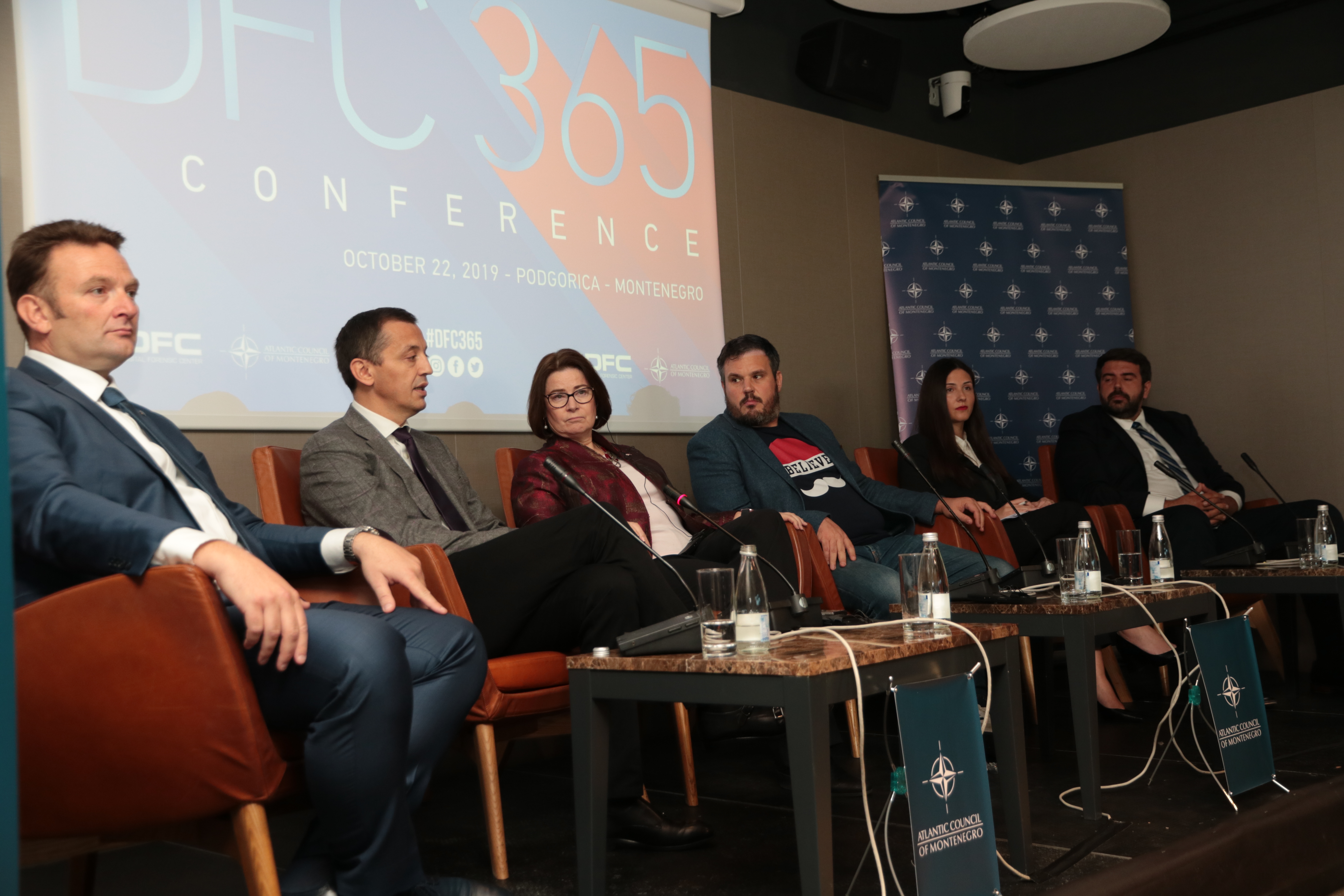“DFC 365“ Conference, organized by the Atlantic Council of Montenegro was held on October 22, 2019, in Centreville hotel in Podgorica. The Conference served as the occasion to present a year of work of the Digital Forensic Center (DFC), a section of the Atlantic Council of Montenegro which is actively engaged in debunking of disinformation and fake news. Additionally, there was a discussion of the key problems and challenges, with a special emphasis on the forthcoming elections, both in Montenegro and in the Western Balkans.
Dr. Savo Kentera, President of the Atlantic Council of Montenegro gave an opening speech and emphasized the importance of the Digital Forensic Center in a fight against undermining of democratic systems.
Kentera said that the Western democracies became too relaxed after the Cold War and it was a huge mistake. According to him, it is high time to shift from defense to offense and take initiative since the year of elections is ahead of us and it will represent a fertile soil for malicious foreign influence. He also added that Montenegro is readier than it used to be to respond to hybrid attacks.
“I believe that we are readier to respond to these attacks than we used to be in 2016 and I think that many things are going to improve. There is a high quality coordination in sharing of the information within the system, but we should also include NGOs, companies and all those who perceive Montenegro as a part of the EU.“, Kentera stated.
Reflecting on the recent messages from Brussels, he emphasized that the region must not be left to wait due to the strengthening of the EU, because, all of those who want to “cover“ this region will eventually do it.
Finally, the President of the Atlantic Council had a clear message for all those who strive to undermine democratic systems:
“You have been trying to accomplish this and you have been successful. Keep trying as much as you want and you can win one or two battles but you will never win a war!”
Milan Jovanović, Analyst of the DFC explained the work of the DFC in his presentation, as presented the publications with accomplishments during the previous year.
According to him, the main target of disinformation was not predominantly the EU, but NATO and Army. Jovanović stated that there were campaigns against the Army of Montenegro which resulted in a belief that we lost our sovereignty with NATO accession. “I am telling you openly that all of this is coming from Russia and has to do with their political agenda“ Jovanović concluded.
Ljubo Filipović, the Chief Analyst of the DFC, highlighted that the trust is more important than the truth in this field and that the disinformation is created specifically in this context. According to him, we should not engage in counter-propaganda, but we should check the facts.
“And first, we should check our work, so that we would not become an easy target for the other party“, Filipović said.
Minister of Defence of Montenegro, Predrag Bošković, commended the cooperation between the Atlantic Council of Montenegro and the Ministry of Defence of Montenegro and said that Montenegro is readier to fight against these issues today than it used to be during the period before NATO accession. „It is a fact that in 2016, Montenegro was the first country in Europe to experience direct interference of external factors, through the usage of different methods. Among the leading campaigns was the creation of false information. Of course, combined with different cyber-attacks and direct attempted terrorist act in Montenegro“, Minister Bošković highlighted.
U.S. Ambassador to Montenegro, Judy Rising Reinke, emphasized that Russia and the USA have two completely different approaches to Montenegro. According to her, Russia attempts to confuse the public and slow the progress of Montenegro, while the USA offers support in building of democratic institutions. Rising Reinke commended the role of the DFC in a fight against demonstrating and creating fake content.
President of the NGO Why not, Darko Brkan, stated that regional cooperation is the key, given the fact that we speak the same language and without regional cooperation, we cannot go deeply into the matter. He also added that the hiding of information is considered disinformation.
Eto Buziashvili, Research Assistant in the Atlantic Council’s Digital Forensic Research Lab, emphasized the importance of social networks when it comes to disinformation and its creation. She said that the cooperation with Twitter and Facebook is crucial since the deactivation of profiles that coordinately spread disinformation helps us narrow the field for misuse of social media.

